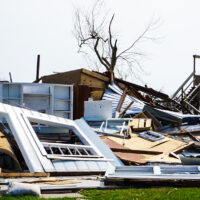How to Stay Safe after a Hurricane

Surviving a hurricane is only half the battle. The other half is staying safe in the hours and days after the storm recedes. At Bundza & Rodriguez, we represent those with hurricane insurance claims, but we also practice personal injury law. We want to encourage everyone in Volusia County and surrounding areas to keep safe during the annual hurricane season. To that end, we offer the following tips.
Find Safe Food & Water
Ideally, you would have stored a few days’ worth of food and water in a water-proof container. If you did not, then finding food and water that are safe to consume is a priority. Throw out any food or water that encountered flood waters, and don’t eat food that has been without refrigeration for at least a few hours.
Local authorities should tell you where to get bottled water. If you need water immediately, you can boil water though that does require a source of electricity.
Treat Wounds
Infection risk is very high following a hurricane. If you suffered a cut, laceration, or abrasion, then it could become infected, especially from flood waters. You should clean any small wound promptly using soap and (safe) water and then cover it with a bandage. Pay attention to signs of infection, such as a painful or raised skin around the wound, fever, and runny discharge. The CDC recommends that you check the wound every 24 hours at least for signs of change and get to the hospital if you notice signs of infection.
Watch Out for Electrocution
The risk of getting zapped is very high after a hurricane. You can reduce the odds by doing the following:
- Don’t use electrical devices if they are wet. If a tool was submerged in water, then you should avoid plugging it in even if it looks dry. Instead, an electrician should check everything before using it again.
- Avoid using an electrical device while standing in water.
- If a power line has fallen on the ground, don’t go near it. Instead, report fallen lines.
- If a downed power line is in water, avoid driving through the water.
Avoid Dangerous Buildings
You might not know how much damage a building has sustained during a hurricane, but there is always a chance that it could be so compromised that it collapses. Ideally, you should avoid going into unfamiliar structures in the immediate aftermath of a hurricane.
Also make sure your own home looks solid before entering. You might be anxious to begin ripping out water-logged carpeting and clean up mold, but ensure that the walls and beams are solid. Check to see if pieces of the roof have been blown off, which could be a sign that your house has suffered serious damage.
Don’t Approach Animals
A lot of animals might be on the loose after a bad storm. Unfortunately, you have no idea if the animal is wild or if it has suffered rabies or another infection. It is best to report strange animals to animal control.
The Daytona Beach hurricane insurance claim attorneys at Bundza & Rodriguez are here for your legal needs. Please give us a call at 386-252-5170 to schedule a free consultation and see if we can help.
Resource:
cdc.gov/disasters/woundcare.html
https://www.daytonalawyers.com/how-to-buy-hurricane-insurance/
